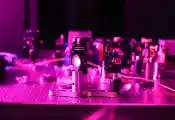QED-C Report Explores Potential Use of Quantum Sensors for Biomedical Applications
Arlington, Virginia, December 11, 2024 -- A new report from the Quantum Economic Development Consortium (QED-C), the world’s premier association of quantum technology pioneers, found that potential use cases for quantum sensors in the biomedical field are vast and may lead to more efficient and accurate medical diagnoses, less invasive techniques, and the collection of more data about patients and conditions to aid in pharmaceutical research.
QED-C members identified the four most common areas of clinical relevance for the use of quantum sensors: infectious diseases, cancer, drug metabolism, and diagnostics. For instance, participants noted that optically pumped magnetometers can image low-magnetic fields of the brain, heart, fetuses, and muscles, potentially leading to earlier diagnosis and faster treatment for diseases like Alzheimer’s and Parkinson’s, as well as traumatic brain injuries, heart diseases, and fetal health.
Quantum sensors could also be used in basic research to better understand cancer, such as in studies of cell death and cell temperature dynamics. They may also be used to treat injuries.
“When it comes to biomedical use cases, quantum sensors could have a dramatic impact on improving the lives of patients,” said QED-C Executive Director Celia Merzbacher. “Our report shows that some of these applications are available to benefit patients now. It also reviews obstacles to commercializing other applications such as insufficient data and funding, a lengthy regulatory process, and a lack of collaboration.”
Additional use cases identified in the report include:
- Subcellular imaging
- Brain imaging
- Tissue oxygenation imaging
- Systemic disease detection
- Biophoton detection for disease diagnostics
- Microbiome analysis
The report noted that quantum sensors can solve numerous challenges that classical computers cannot, such as allowing for less-error-prone machines and significantly shrinking the size of some medical testing devices, possibly leading to better medical outcomes.
“Using quantum sensors for biomedical applications has the potential to revolutionize our approach to treating health conditions,” said Geetha Senthil, Ph.D., deputy director of the National Center for Advancing Translational Sciences, Office of Special Initiatives, at the National Institutes of Health (NIH).
The report presents three recommendations for accelerating the development of quantum sensors for biomedical applications in the public and private sectors as well as academia.
- Increase collaboration between quantum sensor developers and users so developers are aware of use cases.
- Improve cross-sector cooperation and establish more labs for testing at existing national labs or research universities.
- Improve funding of high-impact, high-feasibility biomedical research from federal agencies and venture capital.




































